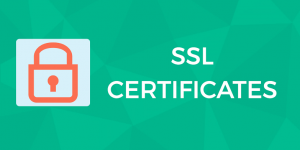SSL certificates have become increasingly important in recent years due to the growing concern over online security. Cybersecurity threats are on the rise, and websites are often targeted by hackers who are looking to steal sensitive information. By using an SSL certificate, website owners can protect their customer’s sensitive data from potential cyberattacks.
Read More: How To Choose The Best Cheap Web Hosting Service
One of the advantages of SSL certificates is that they help to build trust with website visitors. When a website is secured with an SSL certificate, visitors will see a padlock icon in the address bar of their browser. This indicates that the website is secure and that any information transmitted through the website is encrypted. This can give visitors peace of mind and increase their confidence in the website.
Another benefit of SSL certificates is that they can improve search engine rankings. In 2014, Google announced that it would be using HTTPS as a ranking signal in its search algorithm. This means that websites that use SSL certificates are more likely to rank higher in search engine results pages (SERPs) than those that do not.
The purpose of SSL certificates is to provide a secure and encrypted connection between a website and its visitors. This can help to protect sensitive data, such as login credentials and payment information, from potential cyberattacks. By using an SSL certificate, website owners can not only enhance the security of their website but also build trust with their visitors and improve their search engine rankings.
Advantages of SSL Certificates:
- Data Protection: SSL certificates provide encryption for sensitive data such as credit card information, login credentials, and personal information. This encryption ensures that even if the data is intercepted, it cannot be read or used by unauthorized persons.
- Increased Trust: Websites that use SSL certificates are more trustworthy as they display a padlock icon in the address bar, indicating that the website is secure. In addition, some SSL certificates also display the company name, which provides an additional level of trust.
- Search Engine Optimization: Google and other search engines give preference to websites that use SSL certificates, which means that they rank higher in search results. This can lead to increased traffic and visibility for the website.
- Protection Against Phishing: SSL certificates also protect against phishing attacks, where hackers try to trick users into giving away their personal information. A website with an SSL certificate is less vulnerable to these attacks as it is more difficult to impersonate.

Benefits of SSL Certificates:
- Secure Transactions: SSL certificates ensure that transactions such as online purchases and banking are secure and protected from hackers and cybercriminals.
- Improved Customer Confidence: Websites that use SSL certificates provide a secure environment for customers to interact with the website, which leads to increased customer confidence and loyalty.
- Compliance: Some industries such as healthcare and finance are required by law to use SSL certificates to protect patient and customer data. Failure to comply with these regulations can result in hefty fines and legal action.
Read More: Web Hosting Guide – How to Choose a Web Host
Purpose of SSL Certificates:
The purpose of SSL certificates is to provide a secure connection between the server and the client. SSL certificates ensure that the data being transmitted is encrypted and secure, protecting sensitive information from hackers and cybercriminals. They also provide increased trust, improved search engine optimization, and protection against phishing attacks.
– Tips Purpose of SSL Certificates:
- Choose the right SSL certificate: There are different types of SSL certificates available, such as domain-validated, organization-validated, and extended validation. Each type of certificate offers different levels of security and validation. It’s important to choose the right certificate for your website based on your security needs and budget.
- Keep your SSL certificate up to date: SSL certificates have an expiration date, typically ranging from 1 to 3 years. It’s important to keep your certificate up to date by renewing it before it expires. This ensures that your website remains secure and visitors can access it without any issues.
- Implement HTTPS: HTTPS is the secure version of HTTP and is used to transmit data securely over the internet. It’s important to implement HTTPS on your website to ensure that all data transmitted between the server and client is encrypted and secure.
- Use strong encryption: SSL certificates use encryption to protect data transmitted over the internet. It’s important to use strong encryption algorithms, such as AES or RSA, to ensure that data is protected from hackers and cybercriminals.
- Monitor your SSL certificate: Regularly monitoring your SSL certificate can help detect any potential issues, such as certificate revocation or domain validation errors. This can help ensure that your website remains secure and visitors can access it without any problems.
By following these tips and tricks, you can ensure that your SSL certificate is properly implemented and your website remains secure for your visitors.

Conclusion
In conclusion, SSL certificates offer several advantages and benefits, including data protection, increased trust, improved SEO, and protection against phishing attacks. The purpose of SSL certificates is to provide a secure connection between the server and the client. Implementing SSL certificates is an essential step in ensuring the security and privacy of sensitive information in today’s digital world.
*************************



